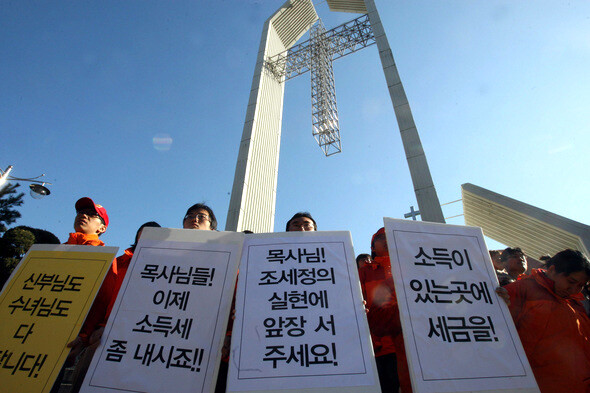hankyoreh
Links to other country sites 다른 나라 사이트 링크
Members of South Korea’s clergy to be taxed

By Kwon Eun-jung, staff reporter
After more than 40 years of debate, the South Korean government will impose taxes on members of the clergy. It also decided to narrow gaps in tax collection by taxing so-called “rank allowance” given to public employees, wealthy farmers who make more than 1 billion won (US$899,000) annually, and fees for plastic surgery.
The Ministry of Strategy and Finance announced on Aug. 8 that it impose a tax on the income of clergy, which it will categorize as miscellaneous income starting in 2015.
“Out of respect for the opinion of religious organizations that the income of the clery should not be seen as pay for ordinary labor, we have decided to treat it as compensation for services rendered and to tax it as miscellaneous income,” said Kim Nak-hoe, head of taxes at the ministry.
“While the tax on clergy will only increase the total tax collection amount by about 10 billion won (US$8.99 million), we have decided to impose it in keeping with the principle that all income should be taxed,” Kim said.
Since the Korean tax office reversed its decision to impose an income tax on clergy in 1968, no Korean government has taxed the clergy. The agreement between the Ministry of Strategy and Finance and religious organizations brings an end to the controversy about taxing clergy that has lasted for 45 years. It is understood that 80% of clergy members’ income will be recognized as necessary expenses and that the tax rate of 20% will only apply to the remaining 20%.
Rank allowance paid to public servants, which had been ignored by the tax code, will also be subject to income tax starting in 2015. Rank allowance, which is determined by regulations on allowance, is paid to all public servants according to their rank. The president receives 3.2 million won a month, and a minister gets 1.24 million won, while the allowance for a level 10 official in a technical post is 95,000 won.
In addition, the non-taxable scope for public servants’ overseas income was adjusted to the level of ordinary citizens.
However, the welfare points that are paid to public servants each year for use at pension stores was viewed not as cash but as kind and was excluded from taxation.
Please direct questions or comments to [english@hani.co.kr]

Editorial・opinion
![[Column] Park Geun-hye déjà vu in Yoon Suk-yeol [Column] Park Geun-hye déjà vu in Yoon Suk-yeol](https://flexible.img.hani.co.kr/flexible/normal/500/300/imgdb/original/2024/0424/651713945113788.jpg) [Column] Park Geun-hye déjà vu in Yoon Suk-yeol
[Column] Park Geun-hye déjà vu in Yoon Suk-yeol![[Editorial] New weight of N. Korea’s nuclear threats makes dialogue all the more urgent [Editorial] New weight of N. Korea’s nuclear threats makes dialogue all the more urgent](https://flexible.img.hani.co.kr/flexible/normal/500/300/imgdb/original/2024/0424/7317139454662664.jpg) [Editorial] New weight of N. Korea’s nuclear threats makes dialogue all the more urgent
[Editorial] New weight of N. Korea’s nuclear threats makes dialogue all the more urgent- [Guest essay] The real reason Korea’s new right wants to dub Rhee a founding father
- [Column] ‘Choson’: Is it time we start referring to N. Korea in its own terms?
- [Editorial] Japan’s rewriting of history with Korea has gone too far
- [Column] The president’s questionable capacity for dialogue
- [Column] Are chaebol firms just pizza pies for families to divvy up as they please?
- [Column] Has Korea, too, crossed the Rubicon on China?
- [Correspondent’s column] In Japan’s alliance with US, echoes of its past alliances with UK
- [Editorial] Does Yoon think the Korean public is wrong?
Most viewed articles
- 1‘We must say no’: Seoul defense chief on Korean, USFK involvement in hypothetical Taiwan crisis
- 2‘Weddingflation’ breaks the bank for Korean couples-to-be
- 3[Reportage] On US campuses, student risk arrest as they call for divestment from Israel
- 4[Column] Park Geun-hye déjà vu in Yoon Suk-yeol
- 5Amnesty notes ‘erosion’ of freedom of expression in Korea in annual human rights report
- 6Korea sees more deaths than births for 52nd consecutive month in February
- 7N. Korean delegation’s trip to Iran shows how Pyongyang is leveraging ties with Moscow
- 8Will NewJeans end up collateral damage in internal feud at K-pop juggernaut Hybe?
- 9[Guest essay] The real reason Korea’s new right wants to dub Rhee a founding father
- 10N. Korean hackers breached 10 defense contractors in South for months, police say